Virulent Newcastle Disease (vND) is the poultry Grim Reaper; this highly contagious, incurable viral disease affects birds and poultry worldwide, killing victims within days of exposure, often with no warning signs.
Southern California chicken keepers have been living a bad Hollywood movie starring virulent Newcastle Disease (formerly known as exotic Newcastle disease) since May 2018 when the first case was confirmed in a backyard exhibition flock. Three cases have been confirmed in commercial laying hen flocks. Euthanasia (aka: “depopulation”) is mandatory for poultry in areas identified as Ground Zero during a vND outbreak. Depopulation is the only way to stop the spread of the virus.
UPDATE: The outbreak continues to spread; as of 6/14/19, the USDA has confirmed 442 cases of vND in California, affecting flocks in the counties of San Bernardino, Riverside, Los Angeles, Ventura, and Alameda. The USDA also confirmed 1 case in Utah County, Utah and 1 case in Coconino County, Arizona.
Virulent Newcastle Disease is not endemic to the United States, it is brought here by a number of sources including: illegally imported birds such as parrots, game fowl for fighting, and certain wildlife. While government officials work to contain and eliminate vND in California, we backyard chicken keepers have a responsibility to understand the significance of this viral killer and the potential ramifications of our actions for our birds as well as others. As poultry keepers, we have a shared responsibility to be good stewards of the species with an obligation to prevent deadly devastation to them on an unthinkable scale.
The last vND outbreak in the US occurred in 2002-2003 when nearly four million birds on 2,500 properties were euthanized, according to Steve Lyle of the California Department of Food and Agriculture. That included 22 commercial poultry operations.
The United States poultry industry generates $48 billion in revenue and is comprised primarily of broiler chickens (8.5 billion birds), layer hens (299 million birds), and turkeys (238 million birds). The implications of the spread of vND in the commercial poultry industry to the US economy and to backyard poultry keepers is staggering.

Swollen & discolored (blue or purple) comb &, wattles.
SIGNS OF VIRULENT NEWCASTLE DISEASE
- Sudden death
- Open-mouthed breathing, gasping for air, coughing, sneezing, nasal discharge
- Swollen head, neck, face or eyelids
- Swollen & discolored (blue or purple) comb, wattles or legs
- Ruffled feathers, drooping wings,
- Tremors, twisting of head and neck, stiffness
- Loss of appetite, decreased activity
- Greenish, watery diarrhea
These signs can be indicative of a whole panoply of poultry diseases, so don’t rush to any conclusions if you see any of these signs in your flock, but do contact the USDA promptly at 1-866-536-7593 or your state’s governing agency listed HERE to speak with an animal health professional for further direction.
HOW IS IT SPREAD?
Virulent Newcastle Disease spreads when healthy birds come in direct contact with bodily fluids from sick birds. The virus can travel on manure, poultry equipment, vehicles, feathers, eggshells, and people who have the virus on their clothing, footwear or hands. There are different strains of Newcastle Disease for which there are vaccines, however, even vaccinated birds can be infected die from vND. The origin of vND in the 2002 outbreak was illegally imported gamefowl. While imported birds are closely regulated at the three ports of entry into the US, (LA, Miami & NYC) illegal imports of parrots (members of the psittacine family) are a known vector along with certain wild birds, including doves & pigeons, and specific waterfowl.
Virulent Newcastle disease is not a food safety concern, and no human case of the virus has occurred from eating poultry. Rarely, people working directly with large numbers of sick birds can develop mild, flu-like symptoms or conjunctivitis, but human infection is easily prevented by using standard personal protective equipment such as respirators and washing hands.
PREVENTION & CONTROL DURING AN OUTBREAK: What Should You Do?
BIOSECURITY
Biosecurity refers to all the measures we take to keep infectious disease out of our chicken yards. Potential disease carriers include: people, including you and other poultry keepers, clothing, shoes, equipment, (shovels, tractors, incubators, wheelbarrows, car tires) and wildlife. High-risk locations include: all other poultry yards, poultry shows, poultry swaps, livestock auctions, fairs and feed stores.
BIOSECURITY DOs & DON’Ts DURING AN OUTBREAK
During a poultry health crisis such as an outbreak of Virulent Newcastle disease or Avian Influenza in your area don’t be a link in the chain of bad practices that brings disease into your flock or infects others’.
- DON’T bring any birds into or out of your yard
- DON’T borrow or loan anything (tools, equipment, clothing, incubators, brooders) from potential disease carriers or from high risk locations.
- DON’T visit high risk locations, including: other chicken yards, poultry shows, farms, ag fairs, chicken swaps, auctions or other places live birds are found.
- DO wash hands before and after entering any poultry yard or feed store.
- DO assign dedicated footwear to your chicken yard that is only worn on your property.
- DO clean and disinfect tires before returning home from a feed store or other locations frequented by poultry keepers.
- DO report sick birds or unusual bird deaths to State/Federal officials right away, either through their state veterinarian or through USDA’s toll-free number at 1-866-536-7593.
My take-home advice for backyard chicken keepers generally: except for baby chicks from an NPIP certified hatchery, do not bring birds into your flock from anywhere else.
EVERYDAY BEST BIOSECURITY PRACTICES
- Require visitors from high risk locations to change clothing, wash hands, and wear disposable shoe covers or dedicated, sanitized rubber-soled footwear before entering your yard.
- Change your clothes, wear clean shoes and wash hands when returning home from high risk locations and when caring for sick chickens in isolation before tending to other flock members.
- Isolate any bird returning from a poultry show for 30 or more symptom-free days before placing them near the rest of the flock.
- Clean & disinfect feeders and waterers regularly. (Virkon S is an excellent, broad-spectrum sanitizer)
- Clean and disinfect chicken coops regularly
- Don’t attract wild birds to the area with bird feeders or bird baths
- Do exercise best practices for rodent control.
- Never add birds exhibiting signs of illness to your flock
- Obtain necropsies when birds die under unknown or suspicious circumstances. More on necropsies HERE.
- Keep a closed flock, which means do not bring poultry from other sources into your yard
- If opting not to keep a closed flock, only purchase birds from recently NPIP certified flocks
- Always properly quarantine newly acquired poultry (except chicks from legitimate hatcheries or feed stores)
Sources available upon request.
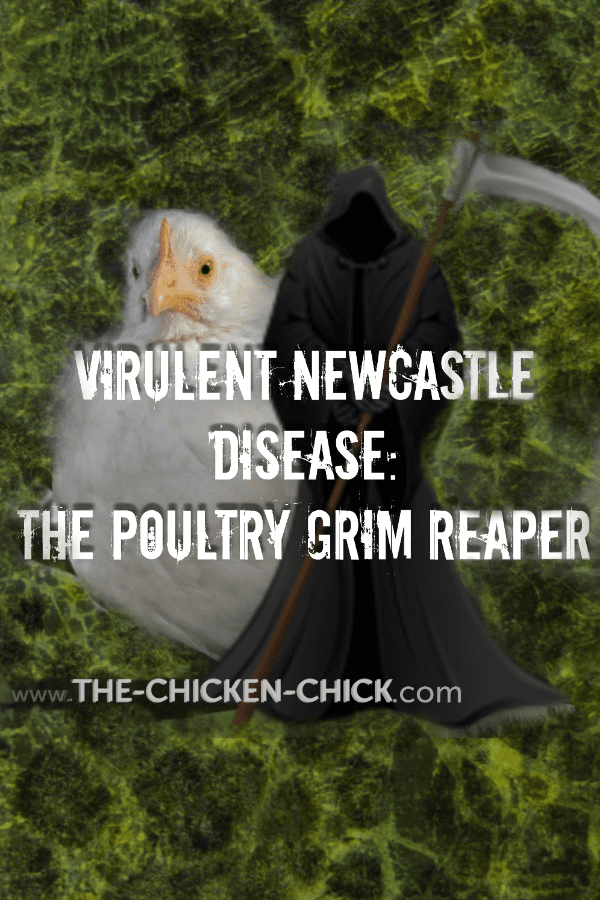
Kathy Shea Mormino
Affectionately known internationally as The Chicken Chick®, Kathy Shea Mormino shares a fun-loving, informative style to raising backyard chickens. …Read on


shop my SPONSORS
Virulent Newcastle Disease (vND) is the poultry Grim Reaper; this highly contagious, incurable viral disease affects birds and poultry worldwide, killing victims within days of exposure, often with no warning signs.
Southern California chicken keepers have been living a bad Hollywood movie starring virulent Newcastle Disease (formerly known as exotic Newcastle disease) since May 2018 when the first case was confirmed in a backyard exhibition flock. Three cases have been confirmed in commercial laying hen flocks. Euthanasia (aka: “depopulation”) is mandatory for poultry in areas identified as Ground Zero during a vND outbreak. Depopulation is the only way to stop the spread of the virus.
UPDATE: The outbreak continues to spread; as of 6/14/19, the USDA has confirmed 442 cases of vND in California, affecting flocks in the counties of San Bernardino, Riverside, Los Angeles, Ventura, and Alameda. The USDA also confirmed 1 case in Utah County, Utah and 1 case in Coconino County, Arizona.
Virulent Newcastle Disease is not endemic to the United States, it is brought here by a number of sources including: illegally imported birds such as parrots, game fowl for fighting, and certain wildlife. While government officials work to contain and eliminate vND in California, we backyard chicken keepers have a responsibility to understand the significance of this viral killer and the potential ramifications of our actions for our birds as well as others. As poultry keepers, we have a shared responsibility to be good stewards of the species with an obligation to prevent deadly devastation to them on an unthinkable scale.
The last vND outbreak in the US occurred in 2002-2003 when nearly four million birds on 2,500 properties were euthanized, according to Steve Lyle of the California Department of Food and Agriculture. That included 22 commercial poultry operations.
The United States poultry industry generates $48 billion in revenue and is comprised primarily of broiler chickens (8.5 billion birds), layer hens (299 million birds), and turkeys (238 million birds). The implications of the spread of vND in the commercial poultry industry to the US economy and to backyard poultry keepers is staggering.

Swollen & discolored (blue or purple) comb &, wattles.
SIGNS OF VIRULENT NEWCASTLE DISEASE
- Sudden death
- Open-mouthed breathing, gasping for air, coughing, sneezing, nasal discharge
- Swollen head, neck, face or eyelids
- Swollen & discolored (blue or purple) comb, wattles or legs
- Ruffled feathers, drooping wings,
- Tremors, twisting of head and neck, stiffness
- Loss of appetite, decreased activity
- Greenish, watery diarrhea
These signs can be indicative of a whole panoply of poultry diseases, so don’t rush to any conclusions if you see any of these signs in your flock, but do contact the USDA promptly at 1-866-536-7593 or your state’s governing agency listed HERE to speak with an animal health professional for further direction.
HOW IS IT SPREAD?
Virulent Newcastle Disease spreads when healthy birds come in direct contact with bodily fluids from sick birds. The virus can travel on manure, poultry equipment, vehicles, feathers, eggshells, and people who have the virus on their clothing, footwear or hands. There are different strains of Newcastle Disease for which there are vaccines, however, even vaccinated birds can be infected die from vND. The origin of vND in the 2002 outbreak was illegally imported gamefowl. While imported birds are closely regulated at the three ports of entry into the US, (LA, Miami & NYC) illegal imports of parrots (members of the psittacine family) are a known vector along with certain wild birds, including doves & pigeons, and specific waterfowl.
Virulent Newcastle disease is not a food safety concern, and no human case of the virus has occurred from eating poultry. Rarely, people working directly with large numbers of sick birds can develop mild, flu-like symptoms or conjunctivitis, but human infection is easily prevented by using standard personal protective equipment such as respirators and washing hands.
PREVENTION & CONTROL DURING AN OUTBREAK: What Should You Do?
BIOSECURITY
Biosecurity refers to all the measures we take to keep infectious disease out of our chicken yards. Potential disease carriers include: people, including you and other poultry keepers, clothing, shoes, equipment, (shovels, tractors, incubators, wheelbarrows, car tires) and wildlife. High-risk locations include: all other poultry yards, poultry shows, poultry swaps, livestock auctions, fairs and feed stores.
BIOSECURITY DOs & DON’Ts DURING AN OUTBREAK
During a poultry health crisis such as an outbreak of Virulent Newcastle disease or Avian Influenza in your area don’t be a link in the chain of bad practices that brings disease into your flock or infects others’.
- DON’T bring any birds into or out of your yard
- DON’T borrow or loan anything (tools, equipment, clothing, incubators, brooders) from potential disease carriers or from high risk locations.
- DON’T visit high risk locations, including: other chicken yards, poultry shows, farms, ag fairs, chicken swaps, auctions or other places live birds are found.
- DO wash hands before and after entering any poultry yard or feed store.
- DO assign dedicated footwear to your chicken yard that is only worn on your property.
- DO clean and disinfect tires before returning home from a feed store or other locations frequented by poultry keepers.
- DO report sick birds or unusual bird deaths to State/Federal officials right away, either through their state veterinarian or through USDA’s toll-free number at 1-866-536-7593.
My take-home advice for backyard chicken keepers generally: except for baby chicks from an NPIP certified hatchery, do not bring birds into your flock from anywhere else.
EVERYDAY BEST BIOSECURITY PRACTICES
- Require visitors from high risk locations to change clothing, wash hands, and wear disposable shoe covers or dedicated, sanitized rubber-soled footwear before entering your yard.
- Change your clothes, wear clean shoes and wash hands when returning home from high risk locations and when caring for sick chickens in isolation before tending to other flock members.
- Isolate any bird returning from a poultry show for 30 or more symptom-free days before placing them near the rest of the flock.
- Clean & disinfect feeders and waterers regularly. (Virkon S is an excellent, broad-spectrum sanitizer)
- Clean and disinfect chicken coops regularly
- Don’t attract wild birds to the area with bird feeders or bird baths
- Do exercise best practices for rodent control.
- Never add birds exhibiting signs of illness to your flock
- Obtain necropsies when birds die under unknown or suspicious circumstances. More on necropsies HERE.
- Keep a closed flock, which means do not bring poultry from other sources into your yard
- If opting not to keep a closed flock, only purchase birds from recently NPIP certified flocks
- Always properly quarantine newly acquired poultry (except chicks from legitimate hatcheries or feed stores)
Sources available upon request.





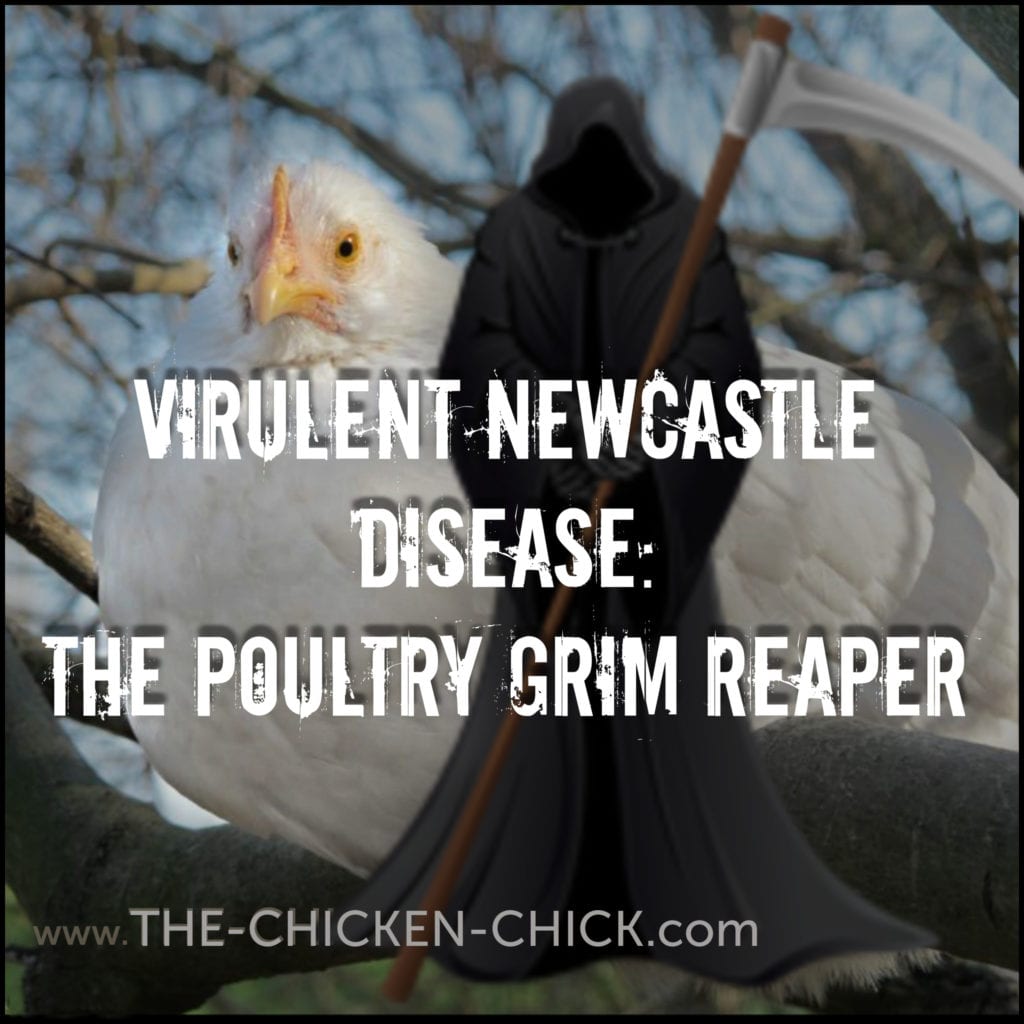







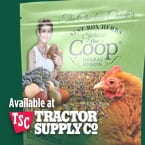

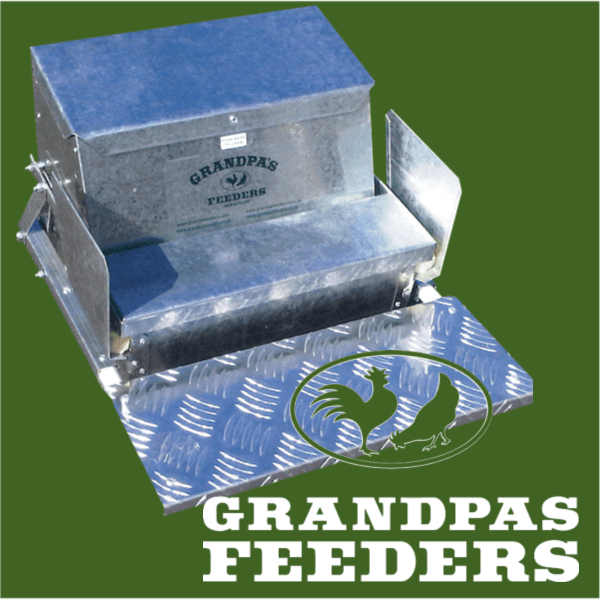


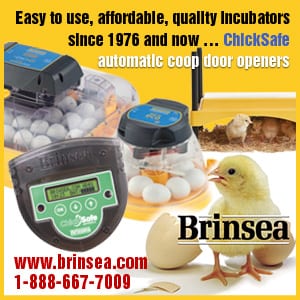



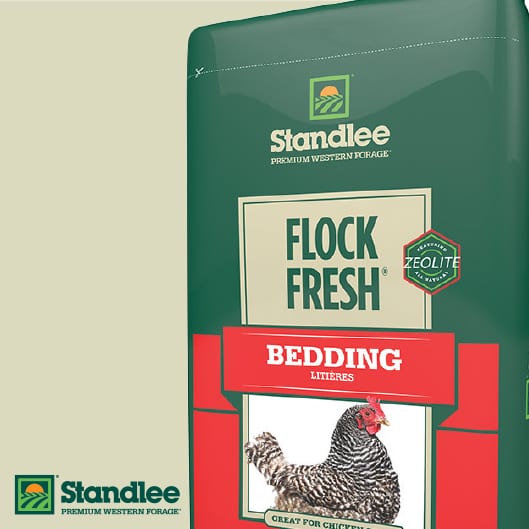
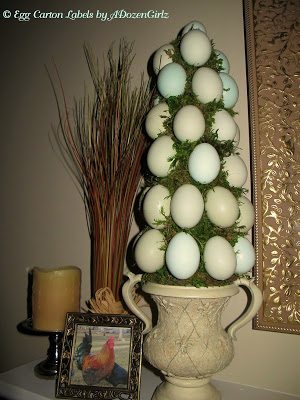

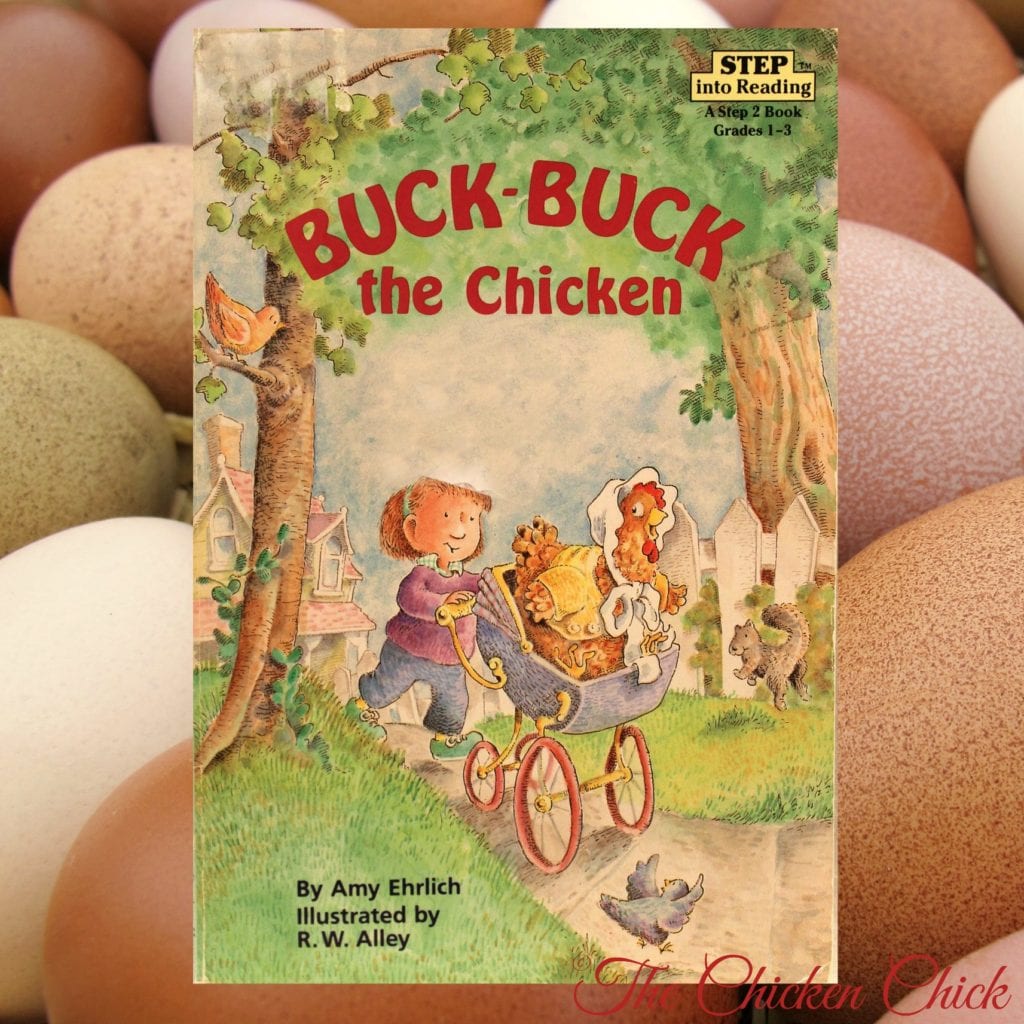













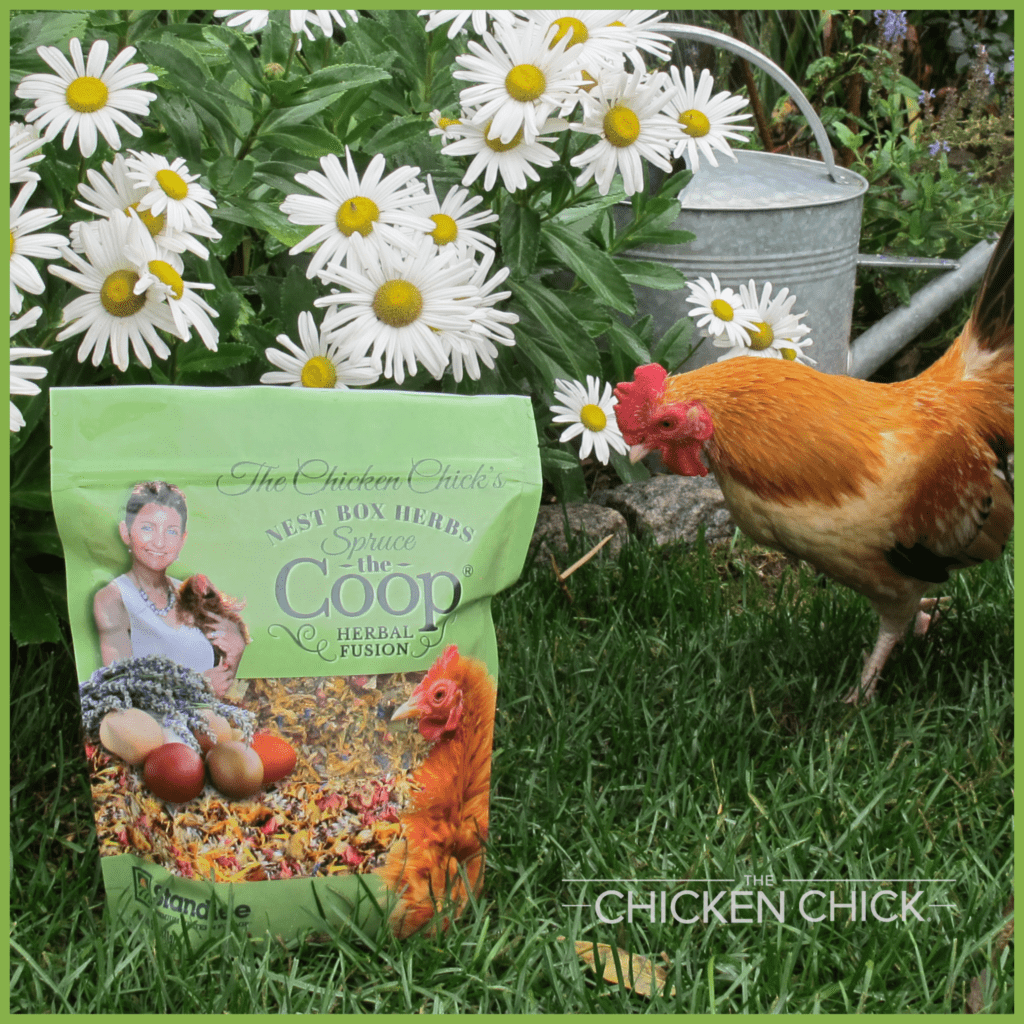

Thank you for sharing this important information. I had never heard of it before and now I’m going to be more aware of it in the future. It’s really painful to loose one of my chicks for either known or unknown reasons.
Can you share where exactly in Southern California? I live in North County San Diego. How aweful ?
Yes, as of 1/10/19: Compton (Los Angeles County), Muscoy (San Bernardino County), Mira Loma/Jurupa Valley (Riverside County), Perris (Riverside County)
You can see an up-to-date map with much more information from the California Dept. of Ag at this link: https://www.cdfa.ca.gov/ahfss/Animal_Health/newcastle_disease_info.html
Years ago in California, inspectors actually were the carriers between farms! Finally occurred to them to wash or cover their shoes/boots.
Covering footwear isn’t adequate either.
I appreciate how much you care for these sweet birds. Thank you for the info.
THis is in my area.I would hate to loose my girls